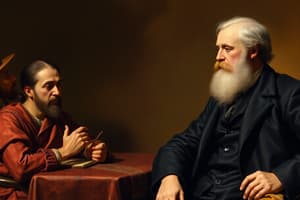Podcast
Questions and Answers
What was the central theme of Giuseppe Mazzini's political ideology?
What was the central theme of Giuseppe Mazzini's political ideology?
Nationalism and federalism
What concept drove Mazzini to seek a united Italy free of foreign influence?
What concept drove Mazzini to seek a united Italy free of foreign influence?
Self-determination
What were some of the recurring themes in Mazzini's writings and speeches?
What were some of the recurring themes in Mazzini's writings and speeches?
Patriotism, liberty, and justice
How did Mazzini believe nationalism could serve as a unifying force?
How did Mazzini believe nationalism could serve as a unifying force?
What system of government did Mazzini champion to allow greater autonomy for regional governments?
What system of government did Mazzini champion to allow greater autonomy for regional governments?
What was the name of the movement established by Mazzini in 1831 to propagate his nationalist ideas?
What was the name of the movement established by Mazzini in 1831 to propagate his nationalist ideas?
What were the key elements of Mazzini's strategy for unification?
What were the key elements of Mazzini's strategy for unification?
Who were some of the Italian patriots inspired by Mazzini's writings and ideas?
Who were some of the Italian patriots inspired by Mazzini's writings and ideas?
What political landscape did Mazzini's ideas help shape in Italy?
What political landscape did Mazzini's ideas help shape in Italy?
What form of government emerged from the Italian unification process?
What form of government emerged from the Italian unification process?
When was the first Italian Republic established?
When was the first Italian Republic established?
What are some of the ways Mazzini's legacy extends beyond Italy?
What are some of the ways Mazzini's legacy extends beyond Italy?
Flashcards are hidden until you start studying
Study Notes
Giuseppe Mazzini and Italian Unification
Giuseppe Mazzini (1805-1872), a pivotal figure of the Italian Risorgimento, devoted his life to the unification and liberation of Italy from foreign rule. This article delves into Mazzini's role in the process of Italian unification, highlighting his political theories, strategies, and the impact of his actions.
Mazzini's Political Beliefs
Mazzini's political ideology centered on the concept of nationalism and federalism, advocating for the unification of Italy as a democratic nation-state. His belief that all individuals have the right to self-determination drove him to seek a united Italy free of foreign influence.
Mazzini's writings and speeches often revolved around the themes of patriotism, liberty, and justice. He believed that nationalism, rather than serving as a source of division, could serve as a unifying force, allowing diverse populations to coexist peacefully. He also championed federalism, which called for a decentralized system of government, allowing for greater autonomy for regional governments.
Strategies for Unification
To achieve Italian unification, Mazzini employed various strategies. The Young Italy movement, established in 1831, served as a platform for the propagation of his nationalist ideas. Mazzini also sought to establish connections with like-minded individuals and organizations, forming the secretive and influential Carbonari society.
Mazzini's strategy for unification emphasized the importance of education, culture, and organization. He believed that these elements would help foster a sense of national identity and lay the foundation for a unified Italy. He also recognized the importance of international solidarity, seeking the support of other European nationalist movements.
Mazzini's Influence on Italian Unification
Mazzini's efforts to unify Italy were not limited to his own actions. His writings and ideas inspired a generation of Italian patriots, including Giuseppe Garibaldi and Camillo Cavour. Mazzini's concepts of nationalism and federalism were instrumental in shaping the political landscape of Italy, serving as the driving force behind the creation of the Kingdom of Italy in 1861.
Mazzini envisioned an Italy united as a republic, but his dream was not realized during his lifetime. The Italian government that emerged from the unification process was a monarchy, rather than the democratic republic that Mazzini had envisioned. However, Mazzini's ideas continued to influence the future of Italy, with the first Italian Republic being established in 1946.
Conclusion and Legacy
Giuseppe Mazzini's enduring influence on Italian history cannot be overstated. His tireless efforts, grounded in principles of nationalism and federalism, played a pivotal role in the unification of Italy. Although his dream of a democratic republic did not come to fruition during his lifetime, his ideals and strategies continue to shape Italian politics to this day.
Mazzini's legacy extends beyond the borders of Italy, inspiring nationalist movements and democratic ideals throughout the world. His vision of a united and free Italy remains an inspiring example of the power of political ideals and the dedication of a single individual to a noble cause. V. Ridolfi, "Giuseppe Mazzini" Oxford University Press, 2007.
Studying That Suits You
Use AI to generate personalized quizzes and flashcards to suit your learning preferences.





